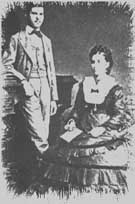|
Sigmund Freud's Childhood by Jean Chiriac
"My life is interesting only if is related to psychoanalysis", Freud said, giving thus us to understand that the events of his biography are not interesting in a biographer's view, but just his
activity on the realm of psychoanalysis. But a different reading of this assertion suggests us something else: the fact that applying Freud's method to the study of the biographical events could bring forward another
biography, which less cares about the biographical "truth", but particularly cares about the meaning and significance of the biographical events in the light of Freud's discoveries, among which we should first of all
mention Oedipus complex. With Octave Mannoni's words: "The confessions Freud made about his youth are like a derived product of his discovery." (O. Mannoni, "Freud", Du Seuil, 1968)
Sigmund Freud inherited from his father the sense of humor, the skepticism before life incertitude, the habit of exemplifying by a Jewish anecdote when he wanted to bring out some moral feature, his liberalism and free thought. From his mother he would have taken "the sentimentalism", an ambiguous word in German, which would mean that Freud was capable of intense emotional feelings. Freud enjoyed the unrestrained love of his mother, Amalia, who called him "my golden Sigi". This unconditional love will make Freud notice: "When you were incontestably the favorite child of your mother, you keep during your lifetime this victor feeling, you keep feeling sure of success, which in reality seldom doesn't fulfill". From the age of eight also comes another remembrance less pleasant that will play an important role in the later victory dream, which the dreamer himself will interpret. The remembrance under discussion put him in a position of humiliating inferiority before his parents. What's this about: he would have been scolded by his father because he intentionally had urinated in his parents' bedroom and apostrophized by these words: "There will come nothing of this boy!". When he narrates this happening, Freud states precisely that this phrase should have deeply afflicted him "in my dreams the scene often repeated, always accompanied by an enumeration of my works and successes, as if I intended to say: <<You see, nevertheless I became somebody! >>."
Another grievous remembrance: his father took him for a walk and narrated an unpleasant event with a passerby who had apostrophized him: "You, Jew - get down from the sidewalk!"
Freud was extremely disappointed when he found out his father hadn't reacted upon the insult of that stranger. "To this scene, which annoyed me - he writes - I opposed another one,
more consonant with my feelings, the scene when Hamilcar Barcas asks his son to swear, before the sanctuary, that he'll take his vengeance on the Romans." Hannibal becomes a hero
to Freud's view and he reappears under the form of the dreams about Rome in his associations from "The Interpretation of Dreams"(1900), from which we also took
out this details. Later on, he presented this happening in the same book, as a resentment motive, which was constantly present. He extracts from this the sources of the feelings that
made him identify himself with Hannibal: "Hannibal and Rome - Freud writes at this opportunity - symbolized the opposition between the Jewish tenacity and the organizing
spirit of the Catholic Church". Moreover: "the wish to go to Rome became at the delirious level the veil and symbol of many other ardent wishes, which need for their achievement
persevering and steadfast hard work... and their fulfillment seems to be as less favored by destiny as was Hannibal's lifetime wish to enter Rome".
When he was four years old, as his father met with a business failure, Freud and his family settled down in Vienna, a noisy and cosmopolitan metropolis, which will sensitively stand in
contrast with the lawns and mountains from Moravia, to which Freud will forever feel attached. "Under deep sediments, it continue to live inside myself the happy child
from Freiberg... who has received from this air and this earth his first unforgettable impressions", Freud remarked and he will even state precisely: "I 've never felt within my depth in
this city [Vienna]. I believe nowadays that I've always regretted the marvelous forests of my childhood, and one of my remembrances evokes me the fact that I used to run as if I
wanted to get off from my father, when I was scarcely able to walk..." |
